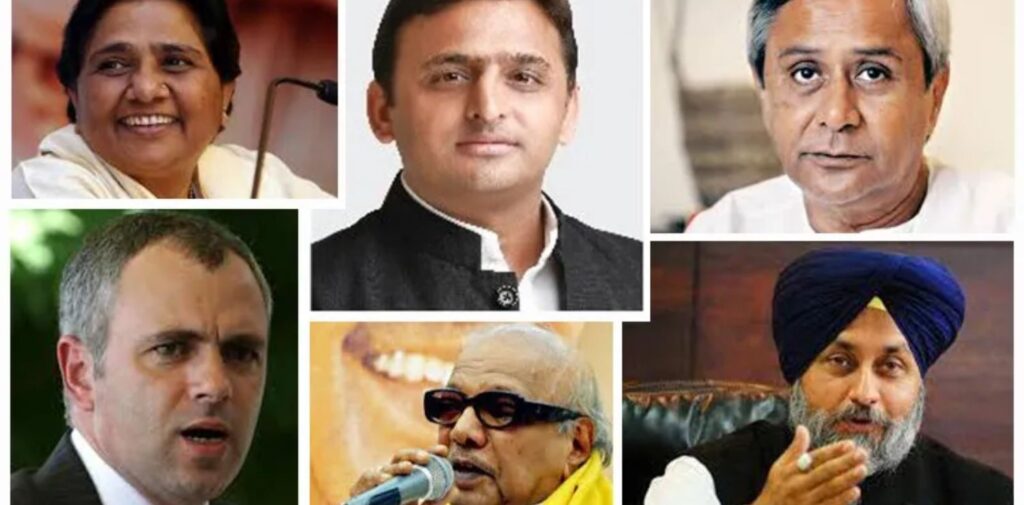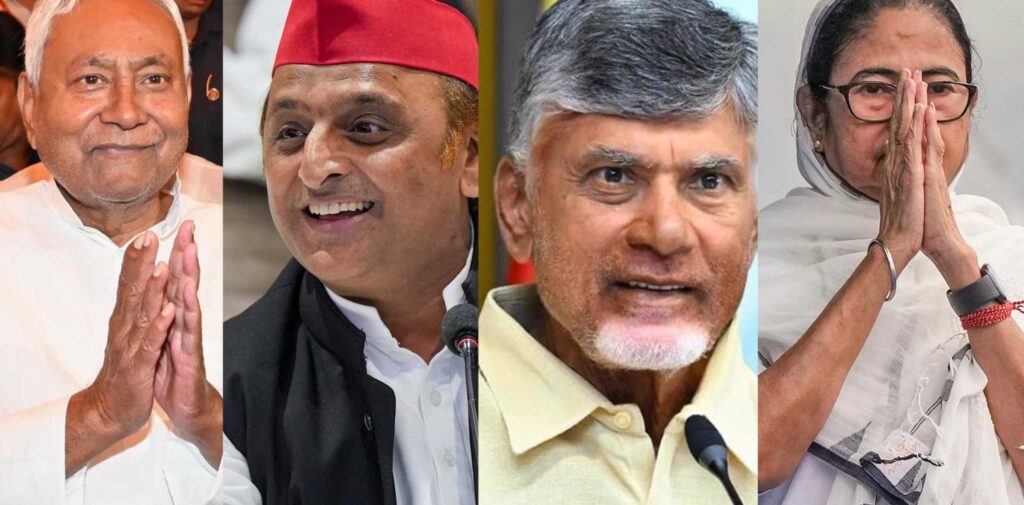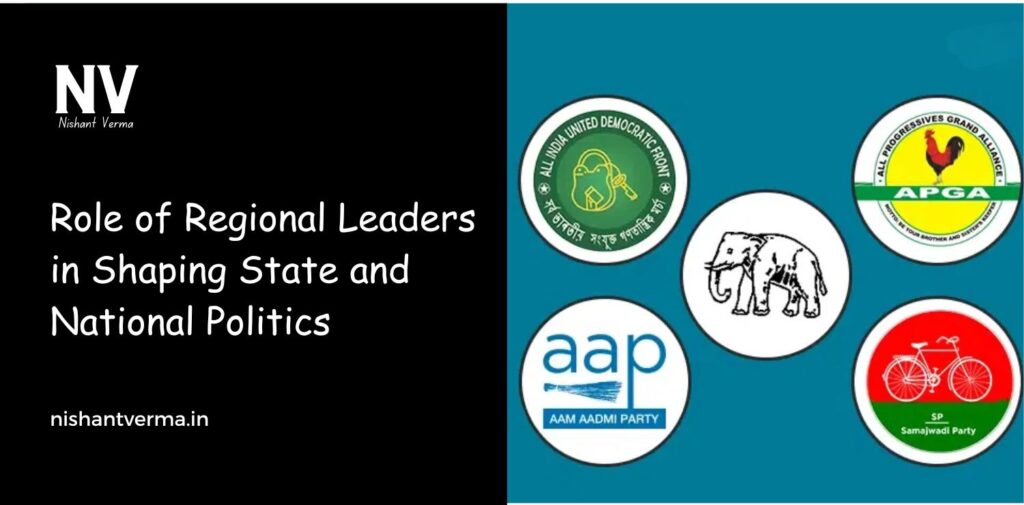India is a country that is made up of many different states and regions. Each state has its own unique culture, language, and traditions. Over the years, many regional leaders have played a key role in shaping the politics of their states and even of the entire nation. These regional leaders are important figures who have worked hard for the development of their states and often influence the national politics of India.
In this article, we will learn about the role of regional leaders in shaping state and national politics and how their actions have made a difference in the country’s history.
Who Are Regional Leaders?
Regional leaders are political figures who are important in a particular state or region of India. They may belong to local or regional political parties, or sometimes even national parties. What makes them different is that they focus primarily on the issues that are important to the people of their state or region. They work on problems that affect the local communities, such as education, health, infrastructure, and jobs.
Regional leaders can become very powerful because they connect with the people in their states and understand their needs. Many of these leaders have been able to influence national politics by being strong voices for their regions.

Regional Leaders and Their Influence on State Politics
The first place where regional leaders have the most influence is in their own states. They fight elections to become the Chief Ministers or other key leaders in their states. Once they are in power, they focus on making changes that will benefit the people of their state.
For example, when a regional leader becomes the Chief Minister of a state, they create laws and policies that focus on local issues. They try to improve education, healthcare, and infrastructure within the state. They also ensure that the voices of the people in their state are heard in the national government.
Many regional leaders have successfully brought about important changes in their states. Let’s take a look at a few such leaders.
Important Regional Leaders in India
1. N.T. Rama Rao (NTR) – Andhra Pradesh
N.T. Rama Rao, also known as NTR, was a popular actor and politician who became the Chief Minister of Andhra Pradesh. He was loved by the people for his charismatic personality and his ability to understand their needs. NTR brought many reforms in Andhra Pradesh, especially in agriculture and education. He is remembered for giving importance to the welfare of farmers and the poor. His leadership was a game-changer for the state and also inspired many other regional leaders to focus on their people’s welfare.
2. M. Karunanidhi – Tamil Nadu
M. Karunanidhi was another important regional leader from Tamil Nadu. He was the Chief Minister of Tamil Nadu for several terms and was known for his commitment to the people of the state. He was a strong leader who focused on improving the lives of poor and backward sections of society. His policies included promoting education, social justice, and providing basic services to the people. Karunanidhi also worked on strengthening the Tamil language and culture, making him a hero for many people in Tamil Nadu.
3. Mayawati – Uttar Pradesh
Mayawati is a well-known regional leader from Uttar Pradesh. She was the Chief Minister of the state and led the Bahujan Samaj Party (BSP). Mayawati is famous for her work in improving the lives of Dalits (the lowest social group in India) and other backward communities. She focused on building a more equal society by creating laws that helped protect the rights of these communities. Under her leadership, Uttar Pradesh saw changes in education and infrastructure, and Mayawati became an influential leader in the state and the country.
4. Mamata Banerjee – West Bengal
Mamata Banerjee, also known as Didi, is the current Chief Minister of West Bengal. She founded the Trinamool Congress (TMC) and has been a major force in the state’s politics for years. Mamata Banerjee’s leadership has focused on empowering women, improving education, and creating job opportunities. She has also worked to protect the cultural identity of West Bengal. Mamata’s influence has spread beyond her state and she has been an important voice in national politics, often speaking out on issues that affect the people of India as a whole.
5. Naveen Patnaik – Odisha
Naveen Patnaik is the Chief Minister of Odisha and is known for his long and successful rule in the state. He is the leader of the Biju Janata Dal (BJD). Patnaik’s leadership has brought positive changes to Odisha in areas like education, health, and disaster management. His government has focused on improving the quality of life for people in the state, especially in rural areas. Naveen Patnaik’s leadership has been so strong that he has been re-elected several times, and his party has remained dominant in Odisha for many years.

Regional Leaders and Their Impact on National Politics
While regional leaders focus on improving their states, many of them also have an impact on national politics. This happens when they speak up about national issues, form alliances with other parties, or support a national party during elections.
For instance, during national elections, regional parties sometimes form alliances with bigger national parties like the Indian National Congress (INC) or the Bharatiya Janata Party (BJP). These alliances are important because they help the national parties gather enough votes to win a majority in the national parliament.
Many times, regional leaders are key players in these alliances. Their influence can help the national government pass important laws and policies. For example, during the elections, regional leaders may negotiate for certain benefits for their states in exchange for their support to the national government.
Let’s take a look at how regional leaders have affected national politics in India.
Regional Leaders and Coalitions
In India, coalition governments are common. A coalition is when different political parties come together to form a government. This is often necessary because no single party has enough support to form a government on its own. Regional parties play a major role in these coalitions because they represent the interests of their states and often have a lot of support in their regions.
1. The United Front Government (1996-1998)
In 1996, a coalition government called the United Front was formed. This government included many regional parties, and it was supported by national parties like the Indian National Congress (INC). The regional leaders in the United Front played an important role in shaping the direction of the government, and they pushed for policies that would benefit their states.
2. The National Democratic Alliance (NDA) and Bharatiya Janata Party (BJP)
In the late 1990s and 2000s, the BJP formed the National Democratic Alliance (NDA) by joining forces with several regional parties. Leaders like Nitish Kumar (Bihar), Ram Vilas Paswan (Bihar), and Shiv Sena (Maharashtra) helped the BJP win elections by providing support from their states. These regional leaders were important players in shaping national policies and in helping the NDA stay in power.

Why Regional Leaders Are Important
Regional leaders are important because they help address the specific needs and problems of their regions. Their local knowledge and understanding of people’s issues make them more effective in making decisions that directly impact their states.
Additionally, regional leaders help maintain the diversity and richness of India’s culture. They ensure that the voices of people from different parts of the country are heard. Their work makes India a more inclusive and balanced country, where every state’s interests are taken into account.
Conclusion
Regional leaders play a vital role in both state and national politics in India. They focus on improving the lives of the people in their states and also influence the direction of national politics. Their leadership has shaped the history and future of India, making them key figures in the country’s political landscape.
From addressing local issues to forming important alliances, regional leaders are crucial to maintaining a strong and united India. Whether in power in their states or working with national parties, these leaders ensure that every region of India is heard and represented. Their efforts continue to shape the politics of today and will continue to shape the politics of tomorrow




